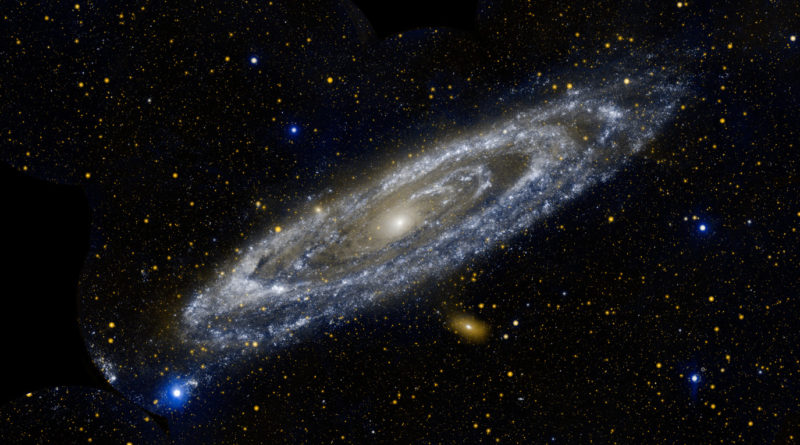Bereshit 5780 – Science and Creation
Bereshit bara El-him et hashamayim v’et ha’aretz, “in beginning God created the heavens and the earth.”
The Torah tells us that God created the world in six days. On the first day God said “let there be light” and there was light. On the second day God created Heaven to separate “the waters above from the waters below.” On the third day God created dry land and plants. On the fourth day God created the sun, the moon, and the stars. On the fifth day God created birds and fish. On the sixth day God first created the land animals, and then said “Let us make man in our image,” and he created Adam and Eve. On the seventh day God rested. Based on the biblical genealogies, the rabbis calculated that this all happened 5,780 years ago.
Science, on the other hand, tells a different story:
In the beginning, 13 billion, seven hundred and seventy-two million years ago, the entire cosmos, all of the universe, existed in a single infinitesimal point. How long the universe was in this condition is a meaningless question—when this point existed, time did not exist. Eventually the point started rushing to expand, bursting outward at the speed of light. At first matter wasn’t even in the form of atoms—it was nothing but free electrons and nuclei. Photons started dancing around. For 377,000 years the universe expanded at the speed of light. Everything was perfectly symmetrical. Matter as we know it didn’t yet exist. After 377,000 years, Hydrogen came into being. The symmetry was shattered. The universe started to become asymmetrical, to get lumpy. After a billion years, stars and galaxies started to form, and stars and galaxies continue to get formed today. After 9 billion years the first unicellular life on earth came into being, continually changing and evolving over the next 4 billion years until man evolved from the apes.
Fundamentalists – Jewish, Christian, or Muslim – are people who take the Scriptures’ words literally. Jewish fundamentalists believe the universe is actually 5,780 years old. Christian fundamentalists, using a similar methodology, believe the world was created around 7,000 years ago. If you ask fundamentalists “what about the fossils of dinosaurs?” you’ll get a variety of responses, including “God made them that way to fool with us.”
Whether you use the Jewish calculations or the Christian calculations the results are a very long way indeed from what science tells us: that the universe is 13.772 billion years old, and our planet Earth has been around for 4 billion of them.
What are we to do with this glaring inconsistency? Which is it? 14 billion years, or 5,780 years?
How do you reconcile the Bible with science?
The first option is to just say “choose!” An atheist scientist might say the science is obviously correct, and the Bible is a bunch of made up stories.
Fundamentalists would say the science is wrong. They believe you have to accept the Torah and the calculations of the rabbis literally because the Torah comes from God, and therefore it must be literally correct.
Rabbi Menachem Mendel Schneerson, the last Lubavitcher rebbe, had a technical background: he studied at the Sorbonne in Paris and received a degree in electrical engineering from a French technical college. Yet despite that scientific background, he maintained that science was wrong. In an article he wrote in 1962 he said “In view of the unknown conditions which existed in prehistoric times, conditions of atmospheric pressures, temperatures, radioactivity, unknown catalyzers, etc., etc…conditions that is, which could have caused reactions and changes of an entirely different nature and tempo from those known under the present-day orderly processes of nature, one cannot exclude the possibility that dinosaurs existed 5722 years ago, and became fossilized under terrific natural cataclysms in the course of a few years rather than in millions of years; since we have no conceivable measurements or criteria of calculations under those unknown conditions.”
In other words, one response of the fundamentalists to the evidence of science is that the laws of physics have changed in the last 5000 years, and the way the world works today is not the way the world worked 5000 years ago, hence science has been led astray.
Another approach, put forth by Orthodox Jewish scientist Gerald Schroeder, is that both are literally true, just written from vary different viewpoints. We observe the universe from our place in the expanding sphere; God observes it from the center. With differences of perspective, a consideration of when time began, etc., Schroeder argues that the first “day” in the Torah was 7.1 billion years; the second day was 3.6 billion years, etc., and his math makes the six days of creation equal the 13.7 billion years the physicists posit.
Schroeder’s argument is, what we would call in Talmudic terms, k’tzat d’chak, a little strained. And it doesn’t help with the other inconsistencies between the Torah and science, including people who lived to over 900 years old and plants being created before the sun.
Many non-religious people buy into the argument of the atheists versus the fundamentalists. Many people assume that those are the only two choices. That’s what I thought when I was young, and since science was my favorite subject in school, and I was no big fan of Hebrew school, science won out. Buying into that argument was a factor in my staying away from religion for 25 years after my bar mitzvah.
There is, however, another alternative.
Science is great at answering nuts and bolts practical questions. How is the world put together? How does the world function? But it cannot provide answers to moral, ethical, or aesthetic questions. In this week’s Torah portion it says “And God made the beasts of the earth after their kind, and cattle after their kind, and every thing that creeps upon the earth after its kind; and God saw that it was good.” Science can now tell us a lot about the process of how God did this act of creation, how one species evolved from another. But science cannot tell us that “it was good.” The how questions are the realm of science. The why questions are the realm of religion.
There are scientists who claim that science can provide everything, even a basis for ethics. Dr. Norm Hall wrote “Science has succeeded as a cooperative human effort by asserting the belief that the universe can only be understood through the values of integrity and truth-telling. In the process it has become a system of values, and it has provided humankind with a language which transcends cultural boundaries and connects us in a highly satisfying way to all the observable universe. It has the potential to be used as the basis for a workable and profoundly satisfying system of ethics.”
Unfortunately, ethical systems based on science generally seem to be profoundly lacking in, well, ethics. You look at evolution, and the ethics you would derive is “survival of the fittest.” Eugenics is a good thing. Hitler based his ethics on “science,” to create a better race.
It is not rational, and therefore not terribly scientific, to care about what happens to weak, non-contributing members of society. Science will not tell us we are all created “b’tzelem Elohim,” in God’s image. Science will tell us we are created very differently and should be treated differently.
Science and religion need to co-exist. The one needs to inform the other. Just as religious fundamentalists are wrong when they try to deny science completely, atheist scientists are wrong when they try to deny religion completely. And I use the term “atheist scientists” advisedly: surveys show that the percentage of scientists who believe in God or a universal spirit or higher power, about 50%, has remained relatively constant over the last 100 years. All of our scientific progress in understanding the universe has not led more scientists to atheism. Many, like Einstein did, marvel in the intricacy of God’s creations.
And this approach to science and religion, to understand the Torah as speaking metaphorically, to understand that Torah and science teach us different truths, is NOT some kind of Conservative or Reform rejection of the tradition. Many Orthodox Jews believe the exact same thing. While all fundamentalist Jews may be Orthodox, not all Orthodox Jew are fundamentalist.
Maimonides, our great 12th century rabbi, said anyone who interprets the Torah literally distorts the Torah. More recently, Rabbi Abraham Isaac Kook, the very Orthodox first chief rabbi of Palestine in the early 20th century said “the theory of evolution accords with the secrets of Kabbalah better than any other theory. Evolution follows a path of ascent and thus provides the world with a basis for optimism. How can one despair, seeing that everything evolves and ascends? When we penetrate the inner nature of evolution, we find divinity illuminated in perfect clarity. Ein Sof, the infinite God, generates, actualizes, potential infinity.”
So why is it that I bought into the false dichotomy of science vs. religion? What is it that kept me away from religion all those years?
I believe the problem is that my Jewish education stopped with my bar mitzvah.
Children are not simply little adults. The psychologist Piaget identified stages of cognitive development that we all go through. When teaching children you simply cannot go into abstract philosophical concepts. They are incapable of learning them. Even smart kids simply haven’t developed the cognitive ability to deal with certain ideas.
So in Sunday school we teach the kids Bible stories without a great deal of commentary about the need to understand them metaphorically. We teach them about Adam and Eve, and Noah and Abraham and Moses. We present the stories as written without giving them a bunch of footnotes they wouldn’t understand.
Which is why it is such a tragedy if a young person’s Jewish education stops at the age of thirteen. He or she will have learned the stories of the Bible, but she will not have learned Rambam’s guidance on how we should understand those stories. When the child grows up, he may be left turned off to religion, thinking it’s a bunch of fairy tales that make no sense and have no relevance to life today.
If we are concerned about Jewish continuity, one of the most important things we can do is to keep our Jewish teens learning. It’s only when kids get to high school age that they are intellectually sophisticated enough to deal with abstract ideas, such as “who wrote the Bible?” or “if God is all good, why is there evil in the world?” or “what’s the point of praying?” and the perennial favorite, “what’s the meaning of life?”
And it’s not just the kids who need to keep learning—we all need to. I find it sad that there are many Jewish adults who are very educated and sophisticated with graduate degrees in secular studies, who are 6th grade dropouts when it comes to having a command of the wisdom of the Jewish tradition. Just a few days ago at Simchat Torah as soon as we finished reading the book of Deuteronomy we immediately continued with starting over again at the very beginning of the book of Genesis. No pause, no break. The message clearly being that learning never ends.
We’re at the beginning of the New Year on the Jewish calendar. As Adina and Eliana mark their banot mitzvah today, I want to remind them that today is just a milestone, not the end of the road for Jewish learning. May we all resolve to learn more Torah this year, to share more Torah with our friends and family. And Torah doesn’t just mean the Bible. Go to your favorite bookstore, or go to Amazon and find a book on a Jewish subject that interests you…and read it! And share it!
Shabbat Shalom


